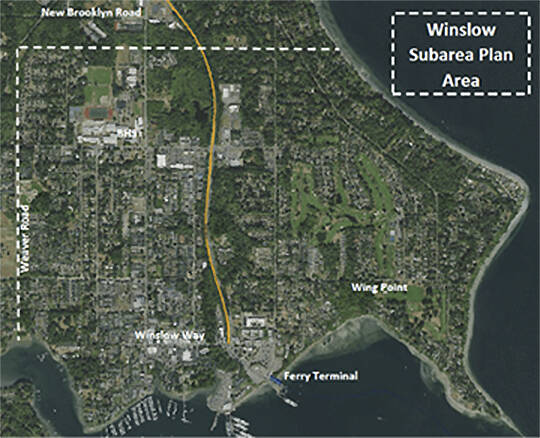It’s kind of like the chicken or the egg — which came first, the development or the development standards?
Since there’s no easy answer, the Bainbridge Island City Council voted to do both at the same time.
The standard would be the Winslow SubArea Plan. The city is working on it right now. But it’s also working on Comprehensive Plan amendments. Rather than finish one and move on to the other, the council decided at its meeting Feb. 14 to continue to work on both at the same time.
If they didn’t, some councilmembers were concerned a major Gateway to BI project would not take place. It had been sailing along in the city’s permit process until the brakes were put on because of work starting on the Winslow SubArea Plan.
Some councilmembers wondered how such a project could be approved when the vision for all of downtown had not been decided. But not deputy mayor Jon Quitslund.
“I’m impatient with delays in the project downtown,” he said, adding developers have spent a lot of money, and he’d hate to see that opportunity lost. He added that the project is consistent with the Comp Plan in place now.
He said it benefits the community in that it’s mixed-use, and has housing for a range of income levels. “It’s exemplary” and will aid us in the SubArea Plan process. Its Comp Plan amendment requests floor area ratio and building height changes.
But Councilmember Kirsten Hytopoulos said she is concerned about the process. It should not be a Comp Plan amendment, along with three from Puget Sound Energy and one regarding a new steering committee process. She said the city can’t put this project “above the larger conversation.”
“It’s not about the quality of the project,” she said, adding it’s not logical to allow this Comp Plan amendment to possibly be approved when it could potentially change once the SubArea Plan is done. “We have the rare opportunity to decide what we are going to look like” in the future.
Councilmember Clarence Moriwaki said the city needs to be more predictable for developers. He expressed frustration how potential developers of an inn at Lynwood Center suddenly were hit with a moratorium “out of nowhere.” The same could be said for this downtown project as they had worked on permits for over a year.
He said he and Councilmember Leslie Schneider live in the area, and if the amendment doesn’t end up fitting with the SubArea Plan it can be rejected. Schneider was afraid the city may be putting the cart before the horse. Councilmember Joe Deets said they should not discuss the merits of the project, and that the SubArea Plan must be the leading policy vehicle. Mayor Brenda Fantroy-Johnson said the project might have to wait because it may not end up being “in line with what we want.”
The latest Comp Plan amendment proposal came by way of the City’s process to invite comp plan applications every three years. Also, the Planning Commission proposes to develop a steering committee made up of three Planning Commission members, three City Councilmembers and three members from the Race Equity Advisory Committee. That committee would guide public participation for the Winslow Subarea Plan. That suggestion came about after some citizens complained that a subcommittee process was bypassed in the current Winslow Subarea plan project.
The entire Winslow SubArea process looks at zoning and regulatory changes for downtown, including sustainable transportation, climate action and race equity.
Planning director Patty Charnas said the previous ad hoc committee was meant for smaller neighborhood centers. Winslow needs a more-extensive community engagement process that was put together by a city consultant. The idea from the Planning Commission would form a committee that would come up with another community engagement plan.
PSE hearing
A public hearing took place regarding Puget Sound Energy’s application for improvements at the Winslow Substation.
The council had a lengthy discussion, mostly about why PSE was using the Comp Plan amendment process rather than a conditional use permit. It wants the zoning changed from residential to business industrial since in reality that’s what’s there already.
The Stetson Ridge Homeowners Association said it would dismiss its appeal if the site is limited to utility uses only.
But that did not sit well with Hytopoulos. She feared with that language some other type of utility could end up there. “It’s a big weapon for such a small problem.”
Councilmember Michael Pollock said he can’t see a lot of industry going there. It was explained that the substation takes up about half of the lot. It was also explained that the substation will be screened from nearby properties and some land would be cleared for potential PSE expansion.
Moriwaki said there is a safeguard in that if something other than a utility tries to go there the zoning would revert back to residential.
Public comment
During public comments, two people complained about local government.
Bill Adams said he has tried numerous times to get questions answered but “no one follows through with answers.” He said the city should designate a person of contact who could set up meetings so the public could be heard.
Pete Brady asked that the city repeal its 25-cent tax on disposable beverage containers. “It’s unjust,” he said, adding that the science in regard to the climate is false. “Government lied to us about climate change.”



